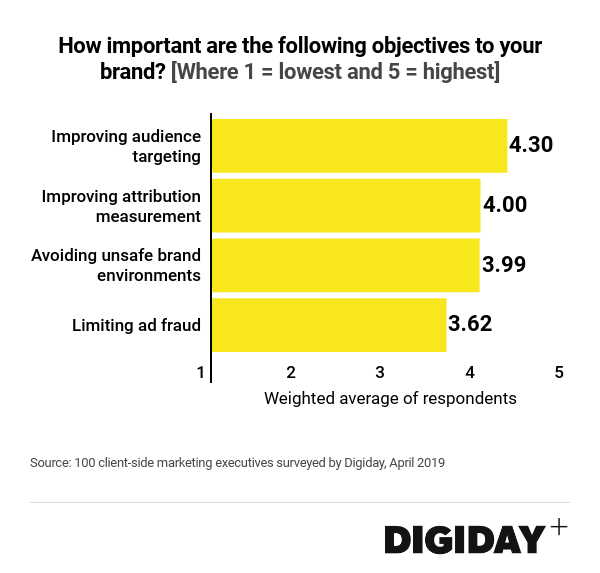Save 50% on a 3-month Digiday+ membership. Ends Dec 5.
Digiday Research: Marketers aren’t prioritizing the fight against ad fraud

A Digiday poll of 100 client-side marketing executives on their media-buying objectives found limiting their exposure to ad fraud as least important.
Using a weighted average for responses, where five equaled most important and one equaled the least importance, improving audience targeting came out on top with a score of 4.3, while restricting ad fraud stumbled in at 3.62. Issues around improving attribution measurement and avoiding unsafe brand environments came in between.

“It’s easier for marketers to deny, deny, deny,” said Keith Hernandez, CEO of Launch Angle,. “Some marketers are saying, ‘this might be an industry problem, but it’s not our problem.”
But unfortunately for marketers, with $20 billion dollars stolen by fraudsters annually worldwide and the growing sophistication of ad fraud tactics, it unquestionably is their problem.
Some also argue that ad fraud is the fundamental issue for marketers giving the impact it has on areas like audience targeting or campaign measurement. ”
How good is audience targeting and how representative is attribution if a significant percentage of the “audience” are bots?” asked Israel Mirsky, Executive Director, Global Technology and Emerging Platforms, OMD Worldwide. Without fighting against ad fraud first, trying to fix other issues could be an effort in futility.
Ad position: web_incontent_pos1
Rather than address the issue themselves, some marketers could still be relying on their agencies to keep them safe from fraudulent ads. Even as work like creating media strategies are increasingly done in-house, the execution and onus for evading ad fraud still reside with the agency.
“We’re are paying tens of millions if not hundreds of millions to agencies to do that due diligence for us. But really, should we?” said Hernandez. Given that the flawed auditing process by agencies and third-parties can fail to shed light on how much fraudulent inventory agencies buy, it is a fair question to ask.
“While ad fraud is universally decried, its true cost is buried in the media stack and daunting to unpack, while the economics of targeting is relatively straightforward,” said Daniel Jaye, CEO of customer-data-platform Aqfer.
More in Marketing

Ulta, Best Buy and Adidas dominate AI holiday shopping mentions
The brands that are seeing the biggest boost from this shift in consumer behavior are some of the biggest retailers.

U.K. retailer Boots leads brand efforts to invest in ad creative’s data layer
For media dollars to make an impact, brands need ad creative that actually hits. More CMOs are investing in pre- and post-flight measurement.
Ad position: web_bfu